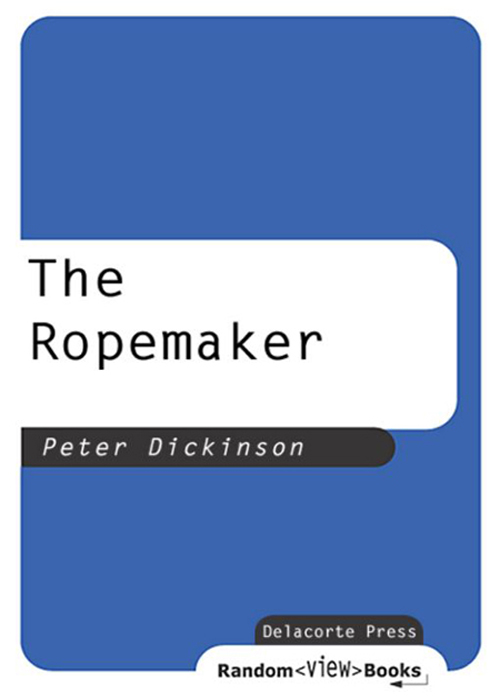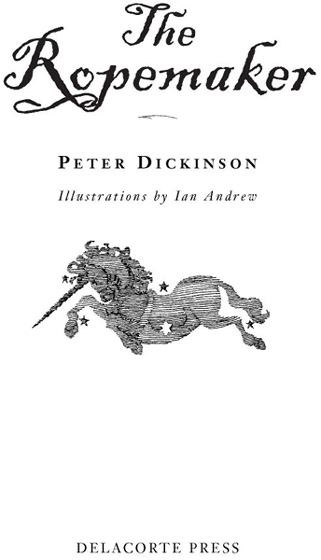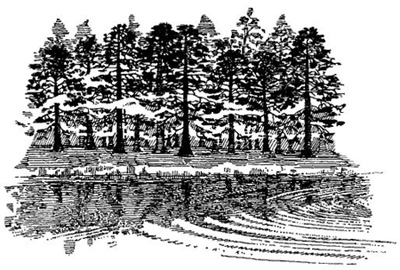The Ropemaker



Table of Contents
The Cost of Living
For Robin
Go then, adventurer, on your vivid journey,
Though once again, of course, I cannot join you—
That is as certain as your happy ending.
The one-armed captain in the pirate harbor
Would know me in an instant for a Jonah.
No gnome would ever speak with me for witness,
And so let slip the spell-dissolving answer
Before you’d even heard the sacred riddle.
I, as it happens, know it from my reading,
But the blind queen would ask it in a language
Not in the syllabus of my old college,
But which your loved, illiterate nanny taught you.
No, I will stay at home and keep things going,
Conduct the altercation with the builders,
Hoe the allotment, fix the carburetor.
I’m genuinely happier with such dealings;
It isn’t merely that they pass the seasons
Until I hear your footstep on the threshold.
Then I will sit and listen to your story
With a complacently benign amazement,
Believing it because it’s you that tell it.
And when you’ve done, and I have asked my questions,
I for the umpteenth time on such homecomings
Will say what’s happened to the cost of living.
Asarta
1
The Forest
It had snowed in the night. Tilja knew this before she woke, and waking she remembered how she knew. Some-where between dream and dream a hand had shaken her shoulder and she’d heard Ma’s whisper.
“It’s snowing at last. I must go and sing to the cedars. You’ll have to make the breakfast before you feed the hens.”
Tilja reached up to the shelf beyond the bolster and pulled her folded underclothes in under the quilt, where she spread them along beside her body to warm through. While they did so she lay and listened to the wind hooting in the chimney above her. Anja, beside her, grumbled in her sleep, clutching at her share of the quilt while Tilja wriggled out of her nightshirt and into the underclothes. Then she slid out and hurried into another layer of clothing, tucked Anja snugly in and finished dressing.
The bed was a boxlike structure set right into the immense old fireplace, on one side of the stove. Her parents slept in a larger box on the far side, but that would be empty by now, with Da in the byre seeing to the animals, and Ma on her way to the cedar lake, far into the forest.
Faint light seeped through the shutters, but she didn’t open them, and not just because of the savage wind that was battering against them and shrieking into their cracks. She liked to do these first tasks in the dark, knowing without having to feel around exactly where to put her hand for anything she needed. Woodbourne was her home, and this kitchen was the heart of it, as familiar to her as her own body. She had no more need to see to find things than she had to put her finger to the tip of her nose. Relighting the stove in the dark was a way of starting the day by telling herself that this was so.
First, she opened the firebox and carefully riddled out the old ash, leaving just the last black embers, flecked with sparks. Onto these she spread a double handful of straw and another of dry twigs, then closed the fire door, opened both dampers, and stood leaning against the still-warm stove while she repeated the fire charm three times. Ma never bothered with the fire charm, but Tilja’s grandmother, Meena, had taught it to her so that she would know how long to wait for the twigs to be well alight before she added the coarser kindling. Usually it took four times, but three would be enough with a wind like this to drag the draft up.
A wind like this? And snowing? That wasn’t right.
Once the kindling was in, and had caught, she slid in four logs, sawn and split to fit the stove and dried all summer in an open shed. The flames began to roar into the flues. Now at last she poked a taper in and used it to light the lamp, poured water into a pan and set it to boil, heaved the porridge pot out of the oven where it had been quietly cooking all night in the remaining heat from the old fire, stirred in a little water and set it beside the water pan to warm through.
Next she finished getting up. She rinsed her face and hands, combed and bunched her hair and slipped into her boots, leaving the laces loose, and opened the door into the yard. At once the wind flung a gust of snow into her face, stinging as if it had been a handful of fine gravel. Brando was out of sight, cowering in his kennel from the storm.
This is all wrong, she thought again as she clumped across to the outhouse. The first snow in the Valley should have fallen a month ago, on a still night, huge soft flakes floating steadily down, blanketing yard and roofs and fields a foot deep by morning. These furious flurries weren’t
snow.
And nothing was really lying. Any flakes that reached the ground were snatched up by the wind and whirled into drifts in the corners of the yard. When a gust hurtled in from another direction it would catch at these and set them streaming away like smoke.
Worse still, checking by touch in the dark of the outhouse, she found that some of the stuff had found its way in through a crack and made a miniature drift across the seat. With freezing fingers she scooped it away, did what she had to and clumped back in a foul temper to the kitchen. She half thought of sending Anja out with a storm lantern to clear the outhouse and block the crack before Da got back, but in the end she did it herself.
By the time he came in she had the porridge hot and the sage tea brewed and the bacon frying, and Anja was up and dressed and clean.
“Stupid sort of snow we’ve got this year,” he muttered. “I hope your mother’s all right.”
“Where’s Ma gone?” said Anja, through porridge.
“She’s gone to the lake to sing to the cedars,” said Tilja. “She’ll be home to cook your dinner.”
But she wasn’t, so Tilja started to do what she could. By noon Da had twice gone up to the forest and as far in among the trees as he dared, the second time foolishly far, so that he came out dazed and unsteady with the strange forest sickness that only affected men. Tilja helped him to his chair and pulled off his boots and put a bowl of hot soup into his hands while he hunched by the fire, shaken by sighs and shudders.
Then they heard Brando’s silly little yap of welcome for someone he knew, so different from his deep bay of warning to a stranger. Anja ran to the door, peered out, turned and shouted, “It’s Tiddykin! Oh, where’s Ma? When’s she coming?”
Tilja rushed out and saw Ma’s pony coming shambling down beside the top meadow. One of her panniers was gone, and the other was dragging and bumping among the snowy tussocks. Tilja was still staring when Da came staggering to the door to look.
Not bothering with boots, she helped him outside, ran to the stable and grabbed a handful of yellownut out of the bin. Tiddykin, who, like most horses, would have crossed the Great Desert for yellownut, limped in after her until the trailing pannier caught behind the door and stopped her.
“I’ll see to her,” said Da from the doorway. “You go and saddle Calico up and fetch your grandmother. Tell her what’s happened. Take a bit of bread to eat on the way—you’ve not time for dinner, and it’ll be long dark before you’re back out of the wood.”
“Wouldn’t it be quicker if I just went straight in? I’m sure I could find my way to the lake. Ma took me last summer.”
“I know where the lake is,” said Anja, who’d never been there. “I can find it.”
“Quiet, Anja,” snapped Da. “And you do what you’re told, Til. I’m not having you lost too. Off you go. Back indoors with you, Anja, and fix your sister some food while she’s getting Calico set.”
“You won’t go back into the forest, will you, Da?” said Tilja.
“When I can just about find my way across my own yard? Now, get on with it.”
Old Calico was much too clever for her own good, or anyone else’s. She had seen and smelled the bitter weather, and didn’t at all want to be harnessed, let alone with the special horse seat which Da had made for Meena, Tilja’s grandmother. Tiddykin usually wore it and it didn’t really fit Calico. Tilja bribed her with yellownut while she tugged at straps and adjusted pads, and had her ready before Da, still stumbling in his walk and propping himself against walls and doorposts, had finished with Tiddykin.
“Will you be all right?” she said.
“Have to be, won’t I? Get moving. You’ll need your coat. Anja’s fixed you bread and cheese.”
“Suppose Meena’s in one of her moods . . . ,” Tilja began. (Children in the Valley called their grandparents by their first names.)
“Tell her what’s up. She’ll come. And take a stick—you’ll need to keep Calico moving.”
And that was true. It wasn’t more than a mile down to Meena’s cottage, but without driving Calico would have taken all afternoon. Tilja sat sidesaddle, huddled into her coat and with head bowed and her hoodstrings drawn tight, and every few yards caught Calico a thwack across the rump to keep her moving even at a sulky walk. When she could Tilja snatched a bite at the vast hunk of bread and slab of cheese that Anja had cut for her. Now she had time to think, she was sick with worry. It was so cold. Ma was lying somewhere in the forest, out on the naked ground. Nobody would live long like that in such weather. Before they were halfway down the lane Tilja lost patience, dismounted, and drove Calico on as she might have driven a heifer, while she herself came behind at a stumbling run. At the gate she tied the reins to the post and ran panting up the path and let herself in.
Meena was at her stove, but had swung round at the rattle of the latch.
“Trouble?” she snapped. “Of course it’s trouble. You wouldn’t be looking for your old grandmother, else, would you?”
“Ma went to sing to the cedars,” gasped Tilja. “She hasn’t come back, but Tiddykin has with one of the panniers gone. Da wants us to go and look for her. You and me. He says I’d get lost by myself.”
“He’s not pure fool, then.”
“He went too far in himself and only just got out. He looks ghastly, and he’s all staggery still.”
“Pretty well pure fool. Never mind me—I’m coming. Where’s my cane? You catch your breath while I get myself together. Then you can help me with my boots.”
She hobbled around, grunting every now and then with the pain of her hip, which was the main cause of her moods. It was obviously bad today, and no wonder, this weather. There was no point Tilja trying to help or hurry her—she hated that, and in any case she had done all she needed in a very few minutes, putting her pots to the side of the stove, closing the dampers, and fetching an extra layer of clothing out of her chest. She let Tilja ease her feet into her ancient boots and lace them and her leggings. By the time she was dressed in her sheepskin coat and hat and swathed to the eyes in scarves you wouldn’t have known whether she was woman or man or troll.
Tilja positioned Calico beside the mounting block in the lane, helped Meena climb it, repositioned Calico, who had of course sidled away, and heard Meena groan with the pain of settling herself into the horse seat Da had made for her because of her hip— more like a padded legless chair than a saddle.
“I’ll do now,” said Meena. “You give me my cane—I’m not standing any nonsense from this stupid creature. Born cussed, and she’ll die cussed, like most of us.”
In fact Calico made good speed home. She was what’s called a barn rat, always ready to head back to her own warm stall. Tilja trotted beside her, and was gasping again by the time they reached the farm, not an hour after they’d set out. Da was watching for them. He looked a little better, his face less ashen behind the black beard, but he’d got his long staff out to help him move around.
“You’ve made fair time,” he said. “It’s around four hours till dark. Do you need a rest, Meena?”
“Best stay where I am,” said Meena. “More trouble than it’s worth, getting on and off this brute. It’s Tilja who’ll be needing the rest—whole way back, she’s run.”
“She can rest on Dusty’s back. I’ve put him in the log sled. If Selly’s hurt you’ll never get her onto a horse. All right, Tilja? Ready to go?”
Without waiting for an answer he took the reins and led them into the barn, where Dusty was waiting between the shafts of the log sled, looking huge and majestic in the dim light. He’d been on the farm less than four months. Da had paid almost twice what he’d meant to for him, and had never before let anyone else handle him. Tilja stared up at the great beast, appalled.
“But . . . but . . . ,” she stammered.
“Tiddykin’s all in,” said Da. “And if she wasn’t, she couldn’t handle the sled that distance. Calico could, but she won’t. Just remember you’re master, and Dusty will remember too. Now, listen. You’ve got rugs on the sled, and a hot flask, a firepot, kindling, logs, a couple of storm lamps, spare oil, a tarpaulin, poles and cords for shelter. That’s all just in case. But I want you well on your way out before dark. Whether or not you’ve found her, you turn back in time for that. You hear that, Meena? For yourself you can do what you want—you will anyway—but I want Tilja home by supper.”
Meena glared down at him. The two of them didn’t get on, which was why she lived down at the cottage. The farm was still hers, in law, and would be Ma’s when she died, but he was the farmer, so he couldn’t help speaking as though he had the say in everything.
Without waiting for an answer he gripped Tilja round the waist and lifted her onto Dusty’s back. It felt more like sitting on the trunk of a fallen tree than riding a horse. He gave her an instant to settle, handed her the reins, took the bridle and led Dusty out into the bitter flurry of the storm. He clipped a leading rein to Calico’s bridle and looped the end over a hook on Dusty’s harness.
“I won’t come up with you,” he said. “Nothing more I can do, and I’m still swivel eyed, and there’s the stock to see to. Good luck, both of you. And thanks, Meena.”
He patted Tilja’s knee and turned away. Anja waved from the kitchen door. Tilja waved back, shook the reins and clicked her tongue twice. Off Dusty strode with Calico trailing beside him, furious and resistant until she got a thwack from Meena, and then plodding sulkily along.
They took the track beside the upper meadow and crossed the spare ground. When they reached the trees Tilja looked back and found that she could no longer see the farm. The wind whined and whistled among the bare branches, and swirled flurries of snow to and fro at ground level, sweeping whole patches bare and gathering the whiteness into sudden drifts. There was no track, but little undergrowth either, and mostly the trees had grown close together and been forced upward toward the light, so that the lower trunks were branchless. Tilja had only once been deep into the forest, on that strange visit to the lake with Ma, last summer. Otherwise they had stayed near the edge, looking for firewood and fungi and setting traps for small game. Though when she and Meena had entered the wood she had had a good idea where the lake lay, now she realized how easily she could have gone astray. Apart from the occasional great cedar towering above the rest, the forest seemed endlessly the same, just pillared trees and gently undulating ground beneath. There was no sun to steer by, and the unsteady wind, buffeting around every which way, was no use either.
Once they were well in among the trees Tilja loosed the leading rein so that Meena could pick her own path. Calico was certainly not going to let herself be separated from Dusty, out here in the forest, but to keep up with Dusty’s enormous stride she had to move at an awkward pace, walking for a bit and falling behind and trotting to catch up.

